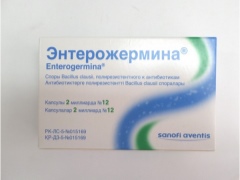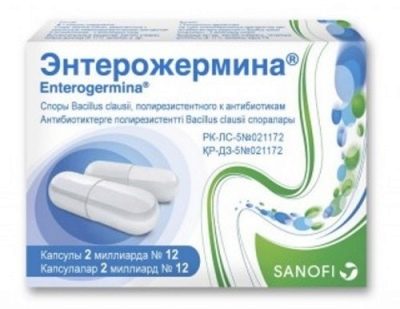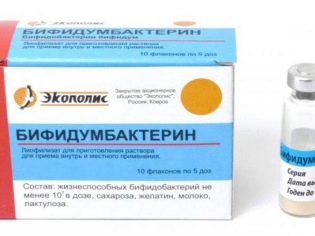Enterohermina for children: instructions for use
When a small child has colic, constipation, diarrhea, or other digestive problems, doctors often prescribe beneficial bacteria in the form of powders, capsules, or solutions. They restore the balance of intestinal microflora and help improve the patient's condition.
One of the drugs with this effect is "Enterohermin". This tool is in demand for dysbiosis and various diseases of the gastrointestinal tract. In addition, it is recommended to take it along with antibiotics in order to avoid their negative effect on the digestive tract.
Release form and composition
"Enterohermina" is produced by well-known company "Sanofi" in several forms. The most popular form of medicine in childhood are bottles containing 5 ml of whitish suspension. Its main component is the spores of probiotic bacteria Bacillus clausii. One bottle contains 2 billion of these spores, and the only auxiliary ingredient in the suspension is purified water.
One pack of the drug includes 10 or 20 bottles.
The second form of medicine, which is used in children a little less - it is white capsules. They are sold for 12 or 24 pieces in one pack and contain 2 billion Bacillus clausii spores in each capsule.
Inactive substances such "Enteroserminy" is magnesium stearate, water, MCC, titanium dioxide, kaolin and gelatin. Some of these compounds complement the spores of bacteria and create a powdery whitish color, while others are used to make a dense capsule shell.
On sale it is possible to meet also portion sachets with powder, but at children's age this kind of "Enterosermine" is not used in one portion due to the higher dosage.
Separately produced drug called "Enterohermina Forte." These are vials with a suspension, which differ from the same form of "Enterosermine" only by a higher (doubled) spore dosage. In one bottle they are contained in the amount of 4 billion and supplemented only with sterile water. One box of "Enterosermine Forte" contains 10-20 bottles of the drug.
Operating principle
The bacteria Bacillus clausii, the spores of which are the main ingredient of all forms of Enterocermine, belong to the normal microflora of the digestive tract. Such microorganisms are resistant to gastric juice and antibiotics, and also participate in the synthesis of various vitamins (in particular, group B). Once in the intestine, spores become active vegetative cells, helping to restore the balance of beneficial bacteria, which is also used in the treatment of diarrhea, colic and other negative symptoms.
Indications
Most often, "Enterosermine" is prescribed for dysbacteriosis caused by various reasons, as well as to prevent such disorders of the intestinal flora. The tool is used after treatment with antibacterial agents and after chemotherapy.
The drug is also recommended for gastrointestinal diseases, which are manifested by constipation, heaviness in the abdomen, diarrhea, bloating and other symptoms.
From what age is prescribed?
The liquid form "Enterosermine" is not used in newborn babies. This suspension, as well as the means "Forte", can be given to children from the 28th day of life. Capsules are appointed from 5 years of age.
Contraindications
“Enterohermine” should not be given to babies with hypersensitivity to the components of such a drug. There are no other contraindications for suspensions and capsules.
Side effects
During treatment with Enterosermine, a rash, hives or other allergic reaction may occur.
In this case, the drug should be stopped, and when symptoms are expressed, a medical examination is required.
Instructions for use
“Enterozhermina” in suspension is most often given to children in one bottle once a day, but sometimes the doctor prescribes to take such a remedy in a bottle twice a day.
Before use, the suspension should be slightly shaken, then open the lid and give the contents of the child to drink undiluted or stir the suspension in a small amount of any liquid (juice, tea, milk).
The drug "Forte" is assigned to children one bottle a day.
The drug in solid form give 1 or 2 capsules per day. This "Enterosermine" needs to be swallowed whole, washed down with any drink. If a child older than five years is difficult to swallow the capsule, do not open its shell and give the contents. For such a patient, it is recommended that capsules be replaced with a suspension.
The duration of taking Enterosermines depends on various factors, among which are the patient’s condition and the course of the disease. And therefore, the duration of the course of taking any form of the drug should be determined by a pediatrician, gastroenterologist, or other specialist. Most often, the prophylactic use of Enterosermine lasts 5-7 days, and when you take antibiotics, the medication is given 7-10 days. But in chronic diseases of the digestive system, the drug is usually prescribed for a longer period - up to 30 days.
Drug interaction
The manufacturer notes that "Enterosermine" can be used simultaneously with cephalosporins, aminoglycosides, isoniazid, macrolides and many other antibiotics.
When combined with such drugs to give a capsule or suspension should be between two methods of antibacterial drug.
Terms of sale and storage
Vials of liquid Enterosermine (including the drug Forte) can be stored sealed for up to 2 years from the date of issue. During such storage of the suspension, recommended at a temperature not higher than +30 degrees, the spores can stick together, because of which visible inclusions are formed, but this does not affect the effectiveness of the drug.
The liquid contents of the bottle after opening immediately give the patient. It is impossible to keep the suspension in the open form, since there are no preservatives in it and the solution deteriorates quickly. Shelf life of capsules is 3 years. There are no special conditions for their storage - the drug must be kept out of the reach of a small child at room temperature.
Reviews
In the majority of reviews about EnteroChermin, such a remedy is called effective, convenient to use and safe for children, including infants. Moms confirm that the drug helped to avoid adverse reactions during treatment with antibiotics or contributed to a more rapid recovery in various diseases of the gastrointestinal tract.
The disadvantages of drugs often include its high price.
Analogs
In case of intolerance or lack of the drug in the pharmacy, other probiotics can be used to replace "Enterosermine", which act on the digestive system in a similar way. The doctor may recommend one of these analogues.
- «Enterol». The effect of this drug on the intestines is due to the microscopic fungi saccharomycetes. The suspension made from powder can be given to children from one year old, and capsules are often prescribed from the age of six, when the child has no problems with swallowing them. The drug is often used for intestinal infections, constipation, giardiasis and poisoning.
- "Linex". The powder form of this medicine contains beneficial bifidobacteria, and capsules contain three types of microorganisms. "Linex" is prescribed for dyspepsia, diarrhea, nausea, abdominal pain and other discomfort symptoms for children of any age, including newborns.
- "Bifidumbacterin". This tool contains several types of bifidobacteria, due to which the drug is used for toxicoinfections, malabsorption, dysbacteriosis, malnutrition, worms, salmonellosis and many other diseases. It is produced in suppositories, tablets, powder and capsules. Children may be prescribed such a drug from birth.
- "Bifiform". The basis of this probiotic is also bifidobacteria, and the dosage forms of the drug are also very diverse. For infants most often use the solution, for one-year-old children - powder, and for patients older than 2-3 years - capsules. The drug is in demand for rotavirus and dysbiosis.
In the next video, Dr. Komarovsky gives some tips on treating intestinal infections.


























